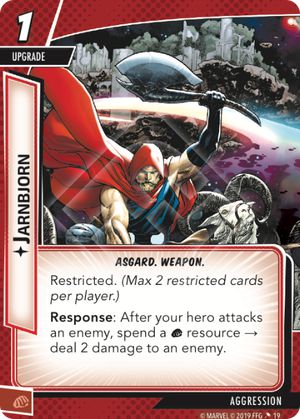I think it's generally accepted that the average value for non-Hero card damage is around 1.5 damage/cost, with Hero cards reaching closer to the 2 damage/cost range.
Non-Hero Aspect Card Examples
Tac Team
- Cost of 3 (true cost of 4) for 6 damage
- 1.5 dmg / 1 cost
Uppercut
- Cost of 3 (true cost of 4) for 5 damage
- 1.25 dmg / 1 cost
Relentless Assault
- Cost of 2 (true cost of 3) for 5 damage (minions only)
- 1.67 dmg / 1 cost
Melee
- Cost of 3 (true cost of 4) for 6 damage
- 1.5 dmg / 1 cost
Hero Card Examples
Swinging Web Kick
- Cost of 3 (true cost of 4) for 8 damage
- 2 dmg / 1 cost
Supersonic Punch
- Cost of 2 plus 1 to go Aerial (true cost of 4) for 8 damage
- 2 dmg / 1 cost
Photonic Blast
- Cost of 3 minus 1 for card draw (true cost of 3) for 5 damage
- 1.67 dmg / cost
Getting back to Jarnbjorn, at the rate of 1.5 dmg / 1 cost you would need to get 6 uses out of Jarnbjorn to get average value. To get Photonic Blast type value (1.67 dmg / card) you would need to get to 10 uses. Any uses beyond 10 and you are approaching some of the best damage value in the game (but you'll never get to 2 dmg / 1 cost because of the initial 2 cost investment to play Jarnbjorn).
-
Cost of 1 (true cost of 2)
-
1 use = 2 damage / total cost of 3
-
2 uses = 4 dmg / 4 cost
-
3 uses = 6 dmg / 5 cost
-
4 uses = 8 dmg / 6 cost
-
5 uses = 10 dmg / 7 cost
-
6 uses = 12 dmg / 8 cost (1.5 dmg / 1 cost)
-
7 uses = 14 dmg / 9 cost
-
8 uses = 16 dmg / 10 cost
-
9 uses = 18 dmg / 11 cost
-
10 uses = 20 dmg / 12 cost (1.67 dmg / 1 cost)
Having to attack first limits it's utility a bit, but on the positive side it does thin your deck out and free up hand space (by being on the board).
Overall, a potentially strong card, but it needs a deck to be built around it. Getting into those double-digit uses will really allow for that positive return on your investment.
